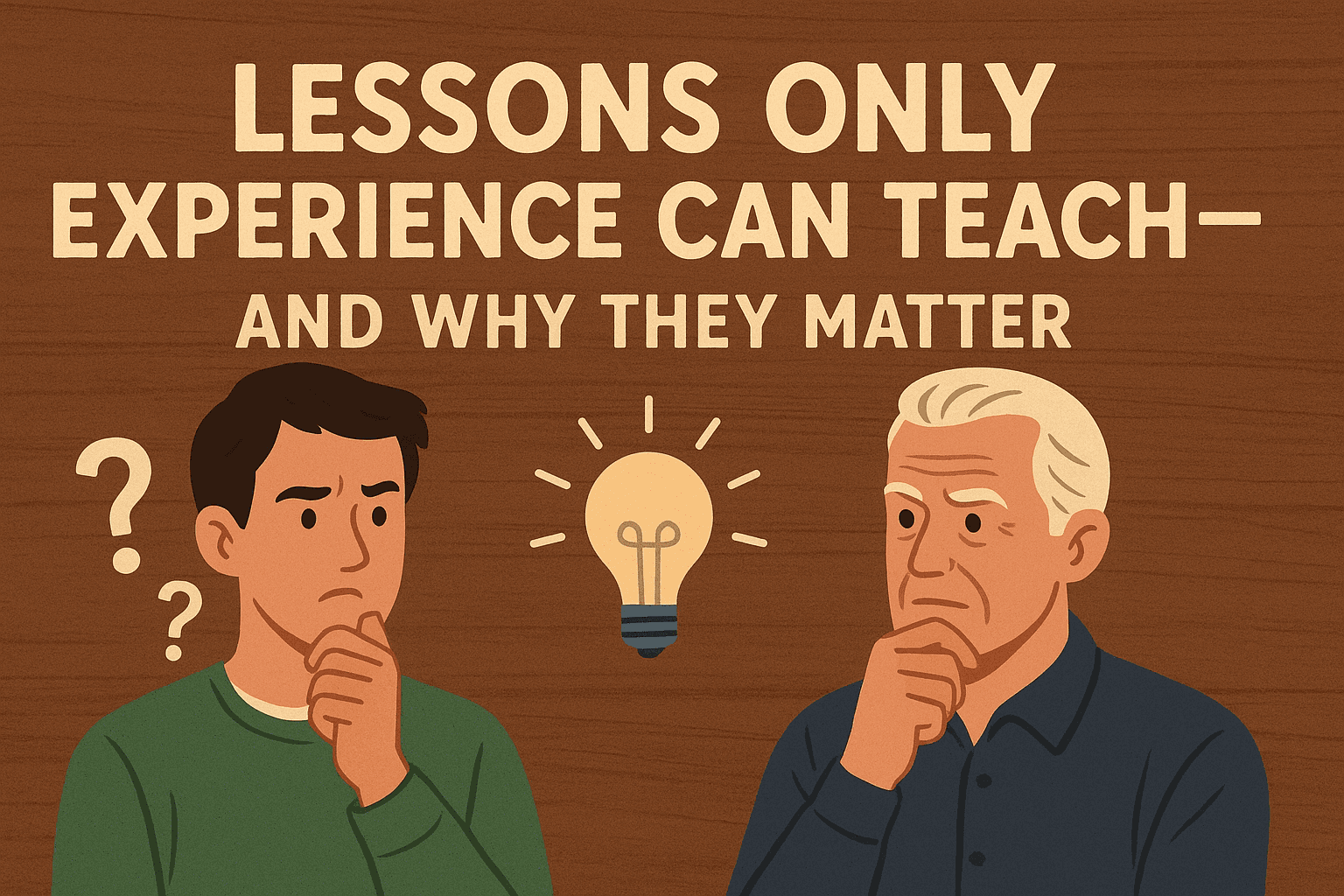
Please wait

Please wait

8/13/2025
You can read all the right books, binge-watch every tutorial, and pass every exam in your field — but some things simply won’t click until you’ve lived them.
That’s because experience isn’t just information; it’s the transformation that happens when you apply what you know, see the results (good or bad), and adapt accordingly. It’s messy, unpredictable, and often humbling — yet it’s the single most powerful teacher you’ll ever have.
Here’s why experience is irreplaceable and the subtle, game-changing lessons it delivers.
When you’re starting out, timing feels like luck. You either catch a good break or you don’t. With experience, you realize it’s more of a skill.
You learn to sense when the market is shifting, when a client is ready to commit, or when a team needs a pause before pushing ahead. That kind of awareness doesn’t come from a chart in a textbook — it comes from being there, making calls, and seeing the ripple effects play out.
Theory paints clean, ideal scenarios. Reality? Not so much.
You might follow the exact steps in a business plan, only to watch an unexpected regulation change derail your launch. You might apply a proven negotiation tactic, only to realize the other side doesn’t follow the “rules.”
Experience is what teaches you how to bridge that gap — adjusting your approach without losing your direction.
If there’s one thing experience drills into you, it’s that plans break. Equipment fails, people drop out, trends shift overnight.
The inexperienced panic. The experienced? They already have three backup plans, and if those fail, they’ll make a fourth on the spot. This ability to pivot comes only from living through situations where you had no choice but to adapt.
You can’t fully learn human behavior from a course. The longer you work with people, the more you notice what they’re not saying.
A hesitation before answering. A glance at the clock. A shift in tone halfway through a meeting. These signals guide your next move — but you only notice them after enough real-world interactions.
Early on, it’s tempting to chase big, dramatic victories. Experience shifts your focus to small, consistent gains.
You see how they build momentum, protect you from burnout, and create a more stable path forward. The big wins still matter, but you stop gambling everything for them.
Do something long enough, and you start seeing patterns.
It might be in client behavior, market fluctuations, or recurring operational issues. These patterns give you foresight — you can predict problems before they escalate or spot opportunities before others even notice them.
Cutting corners sounds like a time-saver — until it costs you twice as much to fix the damage.
Experience leaves you with a scar or two from those moments, and you quickly realize that doing it properly from the start is almost always the cheaper route.
With no experience, risk feels binary: you either take it or you don’t. With experience, you see shades of gray.
You learn which risks are calculated and worth it, which are reckless, and which aren’t worth touching no matter how tempting they look.
When you’ve been around long enough, you see how relationships outlast deals. A client who trusts you will return years later with bigger opportunities. A colleague you treated well might recommend you for your dream job.
It’s not about “networking” in the shallow sense — it’s about genuinely valuing people.
Pressure exposes weaknesses — but it also sharpens strengths.
Experienced people know that in high-stakes situations, your tone matters as much as your decisions. They’ve been in the fire enough to keep calm, make clear choices, and lead others through the chaos.
The longer you work, the more protective you become of your time.
You realize not every project, meeting, or “opportunity” deserves your attention. You learn to say no without guilt because every yes costs you something else.
Inexperience zooms in on details. Experience zooms out.
You start seeing how today’s actions fit into next year’s outcomes. You stop sweating every minor imperfection and instead focus on the bigger moves that actually shape the future.
Perfect is seductive — and destructive. Experience shows that most of the time, “good and done” beats “perfect and never shipped.”
You understand that flaws can be fixed later, but lost opportunities rarely return.
One of the hardest lessons is realizing you can’t — and shouldn’t — do everything yourself.
Experience teaches you when to delegate, when to bring in a specialist, and when stepping back actually serves the goal better than charging ahead.
Perhaps the most valuable lesson of all: failure is not the opposite of success; it’s part of it.
The more you’ve failed, the more you realize each stumble contains a blueprint for doing better next time. And that’s not something you truly understand until you’ve lived it.
Experience isn’t about how many years you’ve been in the game — it’s about how much you’ve learned from the years you’ve had. It’s the quiet accumulation of judgment, instincts, and insight that only comes from doing, trying, failing, adjusting, and trying again.
You can borrow someone else’s advice, but you can’t borrow their experience. And that’s why it’s worth seeking out, building, and respecting — because it teaches lessons nothing else can.

Est exercitation ten

Expert advice saves time, money, and mistakes.

Professional guidance transforms uncertainty into confident action. By offering expertise, objectivity, and tailored strategies, it helps you avoid costly mistakes and move forward faster. From simplifying complex problems to providing emotional support and accountability, the right expert turns confusion into a clear path toward long-term success.